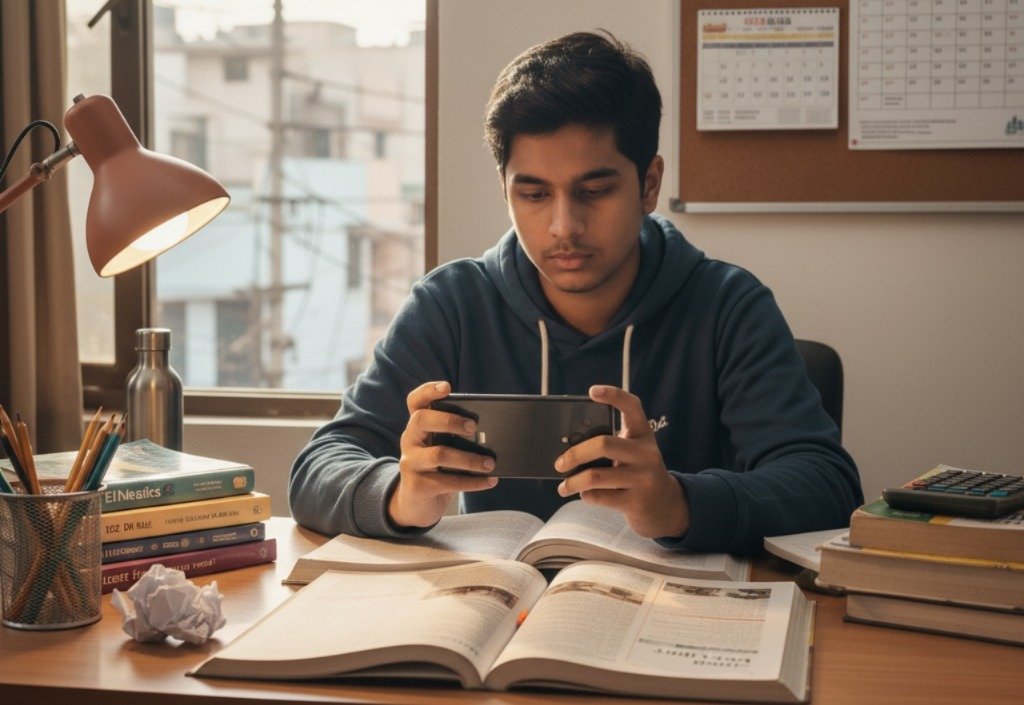Mobile phones, reels, and short videos may seem entertaining, but for students preparing for NEET, JEE, or CBSE exams, they often turn into the biggest distractions. Excessive mobile use damages focus, reduces productivity, and encourages procrastination. Instead of helping with preparation, reels and shorts shorten attention span, making it harder to study deeply. Understanding these disadvantages is essential for success.

Why Excessive Mobile Use is Dangerous for Students
While mobiles are useful for study apps and lectures, uncontrolled use wastes hours. Social media scrolling, random videos, and gaming steal time meant for revision and problem-solving.
The Trap of Reels and Shorts
Reels and shorts are designed to keep users hooked. Every 20–30 seconds, a new video triggers dopamine release, training the brain for instant gratification. For NEET, JEE, and CBSE students, this habit kills patience, shortens attention span, and makes long study sessions feel boring. Students may end up watching reels for hours without realizing how much time was wasted.
Effect on Concentration and Memory
Notifications, endless scrolling, and quick entertainment reduce deep focus. Switching between mobile and books weakens memory retention, making it harder to recall concepts during exams.
Sleep Disturbances Due to Screen Time
Blue light from late-night scrolling delays sleep and causes irregular sleep cycles. Lack of proper rest leads to poor concentration, low energy, and weaker performance in mock tests.
Mental Health Concerns
Constant exposure to social media creates comparison pressure. Seeing peers post achievements can lead to self-doubt and stress instead of motivation.
How Mobile Addiction Wastes Study Hours
Two hours daily on reels or shorts means nearly 700 hours lost in one year. That’s time that could have been spent mastering NCERT or practicing PYQs.
Peer Pressure and Misleading Content
Aspirants often follow random channels or influencers. Unverified notes or shortcuts can misguide preparation. Peer pressure on platforms worsens anxiety about progress.
Physical Health Side Effects
Extended screen use causes eye strain, headaches, poor posture, and reduced physical stamina. This directly affects exam-day endurance.
Tips to Control Mobile Usage
Practical steps aspirants can follow:
-
Keep mobile out of reach during study.
-
Use “Focus Mode” or app blockers.
-
Fix mobile usage slots (30 mins max).
-
Avoid reels/shorts completely.
-
Use mobiles only for lectures, mock tests, or doubt clarification.
Want to know how to manage school exams along with competitive prep? Read: How to Balance CBSE Board Exams and NEET/JEE Preparation Together .
Mobile Use vs Study Success
| Aspect | Excessive Mobile Use | Controlled Mobile Use |
|---|---|---|
| Focus | Distracted, restless mind | Calm, improved concentration |
| Productivity | Hours lost on reels & scrolling | Hours invested in revision |
| Health | Eye strain, poor sleep, stress | Better sleep, strong stamina |
Conclusion
Excessive mobile use, especially reels and shorts, is one of the biggest distractions for NEET, JEE, and CBSE students. It reduces focus, weakens memory, and wastes hundreds of study hours. Students must avoid addictive short-form content and use mobiles only for purposeful learning. By building discipline and staying away from distractions, aspirants can ensure consistent preparation and higher chances of success.
Learn focus-friendly strategies: How to Start NEET 2025 Preparation from Zero and Succeed
Read more on digital wellbeing at WHO – Digital Health